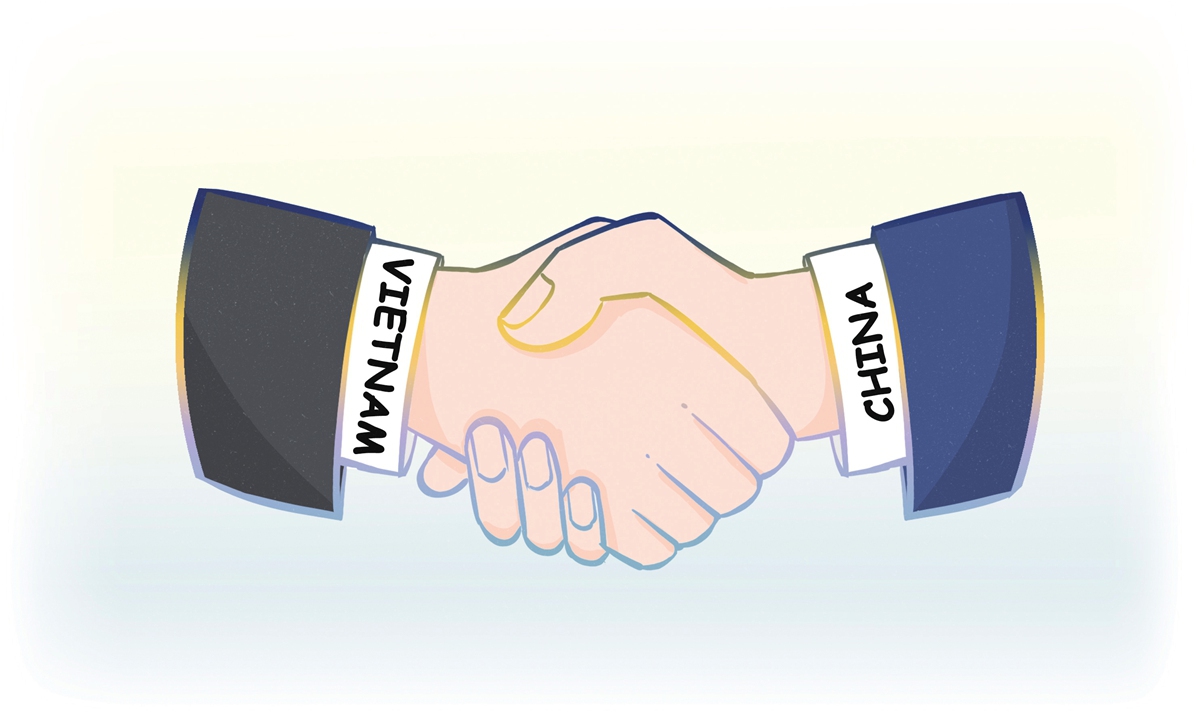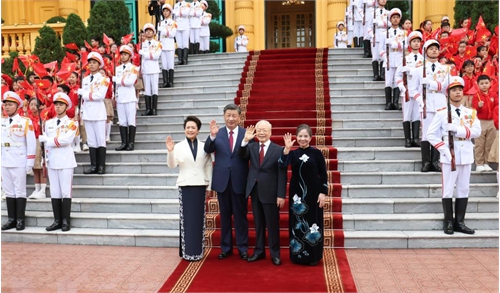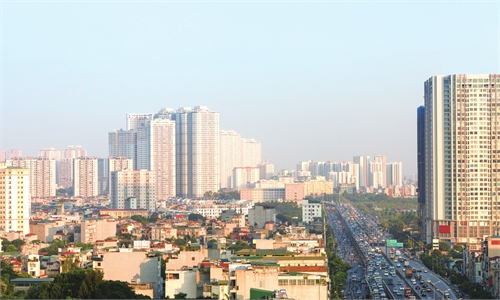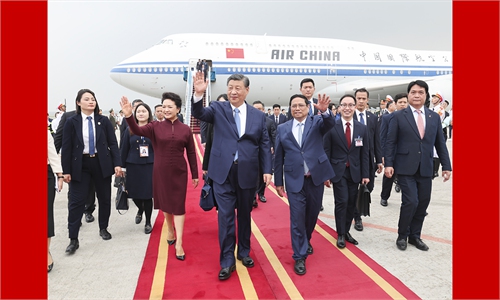Vietnam chooses justice and national interests that can prevent itself from becoming a pawn: former Vietnamese official

Illustration: Chen Xia/GT
Editor's Note:
In a signed article by the General Secretary of the Communist Party of China (CPC) Central Committee and Chinese President Xi Jinping published Tuesday by the Nhan Dan Newspaper of Vietnam, Xi called for the building of a China-Vietnam community with a shared future that carries strategic significance and highlighted the two countries' "traditional friendship featuring 'camaraderie plus brotherhood.'"
In an exclusive interview with Global Times (GT) reporter Li Aixin, Nguyen Vinh Quang (Quang), vice president of the Vietnam-China Friendship Association and former minister counselor-deputy ambassador of Vietnam to China, talked about his understanding of the term "camaraderie plus brotherhood" as well as views on the current China-Vietnam ties and Hanoi's position amid the China-US competition.
GT: Looking back at the high-level interactions between China and Vietnam in recent years, some analysts believe that the two countries have been frequently "visiting each other like relatives." What is your opinion on this?
Quang: Vietnam and China are good friends. We have set the "Four Good" goals: to become good neighbors, good friends, good comrades and good partners. As the Chinese saying goes, more exchanges will bring families and friends closer together. Due to the close relationship between Vietnam and China, it is very important for the high-level leaders of both countries to maintain mutual visits. Communication promotes mutual understanding, and understanding is the foundation of friendly relations.
GT: How do you interpret the term "camaraderie plus brotherhood"? How do you feel about this expression in the context of China-Vietnam relations?
Quang: Looking back at the history of friendly exchanges between the two parties and two countries, it is correct to describe the China-Vietnam relationship as "camaraderie plus brotherhood." In the 1920s, Ho Chi Minh, the leader of the Vietnamese communist movement, established a deep friendship with Chinese communists such as Mao Zedong and Zhou Enlai. They were determined to liberate the people of their country from the shackles of imperialism and colonialism. Both parties have led their people to achieve national liberation and promote national development. In this process, they helped each other. Today, the two countries have also conducted fruitful cooperation in their respective reform and opening-up endeavors, achieving remarkable achievements.
GT: In the field of China-Vietnam economic and trade cooperation, what do you think is the next area of focus and which area has the most potential?
Quang: I believe there is still great potential for cooperation between the two countries. Both countries have many similarities in their development paths, and exchanging theories and practical experiences is a highlight of the cooperation. There is still enormous untapped potential regarding the economic and trade cooperation between the two countries. Vietnam has abundant agricultural and fishery products that can meet China's demands, and many Chinese goods are also popular among Vietnamese consumers. Especially in the new era, both countries are committed to green development, utilizing clean energy and developing the digital economy. These are new areas where China has advantages, and I hope that the two countries can strengthen cooperation, complement each other's strengths and achieve common development.
GT: Do you think the Chinese path to modernization can inspire Vietnam?
Quang: China is a major country and the world's second-largest economy, with a high level of productivity. The Chinese path to modernization elaborated at the 20th CPC National Congress is in line with China's national conditions. Due to some similarities between Vietnam and China, such as both being socialist countries and adhering to the leadership of a communist party, we share some relatively similar social and economic management mechanisms. Therefore, I believe that the Chinese path to modernization can inspire Vietnam's economic and social development and is worth referencing.
GT: Some observers worry that against the backdrop of the competition with China, the US is using Vietnam as a pawn in its Indo-Pacific Strategy. Do you share these concerns? How do you think Vietnam should avoid being exploited by the US?
Quang: Those who are concerned about Vietnam becoming a pawn in US strategy do not fully understand Vietnam's independent foreign policy or the comprehensive strategic cooperative partnership between Vietnam and China. History has proven that Vietnam's reform efforts, including its adherence to independence, self-reliance, diversification and multilateralization of external relations, have been correct. Vietnam should learn from global experiences but mainly rely on its own strength to formulate policies and measures to address its own national affairs without being subject to external pressure or allowing itself to become a pawn of another country. Therefore, I am not worried at all about Vietnam being used to confront any other countries. Vietnam has repeatedly emphasized that it does not take sides. It chooses justice and national interests that can prevent itself from becoming a pawn.
GT: You are one of the main translators of the Vietnamese version of Xi Jinping: The Governance of China. We also know that in recent years, you have been involved in translating at least one book that studies the CPC theories each year. What is the feedback from Vietnamese readers regarding these books? Which parts of these books are more attractive to them?
Quang: In Vietnam, many Chinese books have been translated into Vietnamese and have been well received by our readers. I have personally translated or been involved in translating and proofreading some of these Chinese books, among which I am mostly interested in theoretical works, including Xi Jinping: The Governance of China. The target audience for theoretical works is not ordinary readers but rather officials and scholars, which are a relatively small readership. But I translate these works not for the sake of remuneration but to allow readers to have a deeper understanding of China, its development experience and the reasons for the success of its reform and opening-up. I also want to enhance mutual understanding between the elites of the two countries and promote the development of bilateral relations. Many of these books have attracted the attention of readers, and some have even been reprinted due to increased demand. I believe that Vietnamese readers are interested in the theoretical matters that have emerged during China's reform and opening-up process, as well as China's solutions to them.



